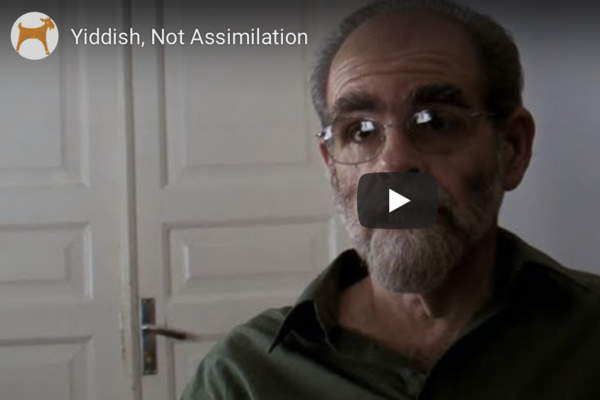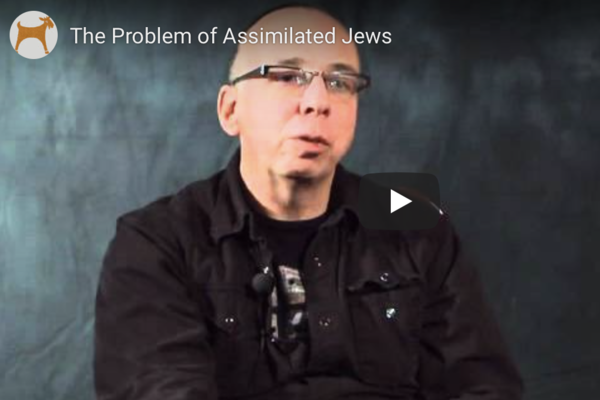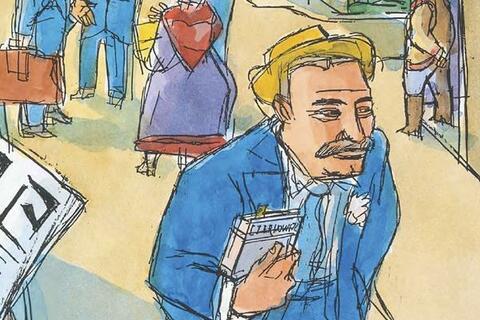Should We Build Our Culture Here in English? Jewish Culture in Yiddish and in English
By Chaim Zhitlowsky, translated by Ri J. Turner
Chaim Zhitlowsky (1865–1943) is best known as an architect of the Diaspora Nationalist and Yiddishist ideologies in the context of Eastern European Jewish political thought. However, he also spent half of his life in the United States and significantly influenced both the ideology and the institutional reality of American Yiddishism, particularly through his contributions to the New York Yiddish press and the North American Yiddish supplementary school system. His attempts to apply Diaspora Nationalist and autonomist models to the American context led to a creative collision between Eastern European multinationalist and American multiculturalist frameworks in his work. From 1906 until his death, Zhitlowsky explored this collision directly in over two dozen public lectures and articles in the Yiddish press and mentioned it tangentially in dozens more. Zhitlowsky's 1931 article “Should We Build Our Culture Here in English?” offers a taste of the surprisingly insightful observations which his political background allowed him to make about the limitations of American Jewish identity as it was emerging before his eyes—observations which are still startlingly relevant today. His aim throughout the article is to refute not the fundamentally reactionary position of pro-English assimilationists, but rather the (in his view) insidiously progressive-appearing position of pro-Hebrew Jewish nationalists, who saw the development of an English-language Jewish culture in America as a mere side effect of embracing what he dubs a “Zionist-Hebrew-ist” [hebreishist] orientation. Zhitlowsky’s aim is to demonstrate that far from being an irrelevant side effect, the development of an English-language Jewish culture in America would be a disaster, leading to the utter defeat of the progressive-nationalist values to which the “Hebrew-ists” (or the bats, in his allegory at the article’s close) claim to subscribe. Nearly a century later, it is now clear that the future that Zhitlowsky was warning against is precisely the one that has come to pass: today's mainstream American Jewish culture is English-language-medium with a “Zionist-Hebrew-ist” bent. Therefore, it is worth asking ourselves to what extent American Jewish culture has ultimately been damaged—or not—by the dire cultural and communal consequences that Zhitlowsky predicted. The Yiddish text of the essay, which was most likely originally published in the New York Yiddish press, can be found in Yid un velt, the first volume of the 1945 four-volume edition of Zhitlowsky’s collected works (New York: Ikuf).
—Ri J. Turner
***
The idea has been raised more than once that here in America we must build our yidishe culture in the English language.
When we investigate the source of this idea, it is not difficult on a concrete level to point to its origin, or more precisely: its three separate origins.
First, the adherents of “Judaism” defend the idea. For them, there is no Yiddishkeit other than the religious, and for them it makes no difference whatsoever in which language one conducts one’s religious life (of course, apart from those parts of religious life that must be conducted in Hebrew according to religious law).
The second source of the idea is the secular-assimilationist one. In previous eras, secular-assimilationist circles did not want to hear about any sort of “Yiddishkeit.” The awakening of the modern progressive-nationalist idea and the education provided by the modern Yiddish school system have compelled them to deal with Yiddishkeit, to adjust to it, and to agree to compromises in its favor.
“Very well, then,” they agree. “We are Jews and we will remain Jews, and we must also give our children a Jewish-nationalist education. But why specifically in Yiddish? Is ‘Yiddish’ Yiddishkeit? Why not in English?”
And the third source of our “Anglomania” is that particular variety of Zionist Hebrew-ism that believes that only a small fraction of our people will find their territorial fortune in the Land of Israel. The cultural life of the Jewish land will naturally be conducted in Hebrew. And Jews throughout the world will be able to participate in the national-Jewish culture only insofar as they have a command of the Hebrew language.
Many such Hebrew-ists may even believe their own claim that it truly pains them that Yiddish is disappearing in this country. “But,” they argue, “what can be done? By disappearing, Yiddish will make space for the one and only ‘chosen’ language, Hebrew. For our children, Yiddish will soon become just as foreign a ‘holy language’ as Hebrew. Therefore, we might as well give them their national-Jewish education in English and teach them the true ‘holy language,’ Hebrew.”
In other words, their position is: Let’s plant a Jewish culture-tree here in English, with Hebrew as an important branch of that culture-tree.
My objective here is not to launch into a polemic against all of these new enthusiasts for a Jewish culture in English. We can of course leave the religious “Judaists” out of the game. We won’t interfere in their religious matters and let’s hope that they won’t interfere in our national matters!
We can also set aside the secular assimilationists. The national-Jewish masks that they have now donned are of such a transparent material that, upon my word, no one finds it difficult to see through them and recognize the charming classic features of the old, full-blooded assimilationist.
Thus, we need reckon only with the Anglomaniacs of the Zionist-Hebrew camp. On national matters this camp expresses clear sentiments that are correct in principle: “We are a people, not a religious sect. We wish to continue to exist as a people everywhere we live, and we wish to build a Jewish spiritual home, our own Jewish culture, everywhere we live.”
If the adherents of this camp also raise their voices in the demand to build a Jewish culture in English, there is a danger that truly progressive-nationally-inclined Jews will listen to and be seduced by their words.
It is against these enthusiasts that we must fight. And we can fight against them, because we stand together with them on one and the same ground: the ground of Jewish progressive-national rebirth.
We, all the supporters of Jewish progressive-national rebirth, aspire to the ideal that the Jewish people should build its own Jewish national culture everywhere. The question arises: can we, in light of the fundamental principles of this ideal of ours, consent to the building of this Jewish culture in English here in America?
My answer: No! We cannot consent to this by any means. And here are the reasons why:
First, we must not lose sight of the fact that we are an international people, scattered amongst various nations and languages, and we are only now beginning to think seriously about our fate in the non-Jewish world and about ways of rebuilding ourself as a normal, modern, progressive, developing people.
In general and in the current historical period in particular, a scattered people needs first of all a free cultural-spiritual web to hold all its parts together. Only a universally human culture of our own can play the role of a cultural-spiritual web of this sort.
I have spoken extensively at various times about this matter [1] and I do not wish to repeat myself here. I wish merely to emphasize that a Jewish culture in the English language would introduce a violent tear into the cultural-spiritual web that is being woven by the development of modern culture in the Yiddish language.
American Jewry, which has played such a significant role in the weaving of this cultural-spiritual web, would be removed from the collectivity of the Jewish people if a Jewish culture were to be built in English. This cannot and must not become our mission here in this country.
We, American Jewry, must not become a separate Jewish cultural unit, thereby isolating ourselves from the collectivity of the Jewish people. On the contrary: we can and must strive to become the avant-garde of the collective Jewish people. We must meld with the collective even more intimately because only by being embedded in the web made up of all parts of our people can we strengthen our chances in the local struggle for our national existence. And we must also meld with the collective in order to strive together as a people for our full national liberation.
But—let us set aside for a moment the kol-yisroel standpoint. For a moment, let us become Bundists of the old school, who tended to consider the Jewish population of each country to be a national unit independent unto itself without the least national connection to the other Jewish populations of the world.
Let’s assume that we, the more than three million Jews in America, comprise a large enough national minority, and have enough energy, to build our own Jewish culture here, without taking into account the other segments of our people.
Then the question becomes: What sort of culture must we build here? In my reckoning, there can only be one answer: If we are going to go to the trouble of building our own culture, it might as well be a “good culture,” which means: a normal, progressive culture, the kind that all progressive peoples in the world enjoy.
What are the fundamental features of a “good” culture?—Take a look at all progressive cultures in the world, and you will see that all of them strive toward the following three fundamental aspirations: well-roundedness, richness, and fertility.
Every culture strives to cultivate activity in all branches of human creativity: from science and technology to art, philosophy, and religion. Every culture additionally strives to encourage each one of these branches of its own tree to flourish as richly as possible, i.e., to achieve at the heights of human potential. And every culture strives, thirdly, to encourage all of its cultural creations to be fertile, that is, to pollinate the entire people; every culture strives to build ramified channels that funnel achievements from the rich cultural pools to the furthest corners of community life—to each corner to the extent to which it can be appreciated there; and to enable, by means of these channels, the most deeply buried creative powers of the people to rise to the highest heights, to the richest cultural pools, just as the Babels and the Gorkis and the Proudhons rose up from the depths to the highest peaks; just as in our sphere the Yoyne Rosenfelds and the Mani Leybs managed to rise up from the workshop and the cobbler’s bench to the most esteemed positions on our Olympus.
We must build here just this sort of well-rounded, rich, and fertile culture for ourselves.
Is this possible in the English language? Absolutely, positively not.
Jewish culture in English cannot be well-rounded. It is intrinsically one-sided, i.e., it necessarily occupies itself with matters that have relevance only to Jews as Jews, and not to Jews as people.
The English works of a Morris Cohen [2] or a Horace Kallen in philosophy, of a Jean Loeb [3] in biology, or of a Dr. Flexner [4] in medicine, however rich, do not belong to Jewish culture nor flow into its pool. They belong to English-language American culture, and, rightly, are credited to its account. This is our Jewish gift, or the dues we pay, to American, not to Jewish, culture.
Jewish-English culture offers only, and can only offer, “menorah-products” in every color and flavor, which are not necessarily a “delight to the eyes” [5] nor a “sweet savor” to the nostrils.
Such a one-sided culture is inevitably also an impoverished one. We cannot hope to dictate to the greatest geniuses among our people that they must take an interest exclusively in Jewish matters, thus carrying out their gifted creative efforts only in that arena. It is logical that the greater the genius and the broader and stronger his wings, the wider the horizon that will spread out beneath his elevated vantage point and the more magnetically universally human matters will attract his interest and his creative powers.
Therefore, anything of ours that outgrows mediocrity will naturally leave behind the narrow sphere lit by the seven-branched menorah to live out its life in freedom, in the sunny sphere of universal human interests. The universal human products of our geniuses, however Jewishly-oriented they may consider themselves, will not belong to our cultural sphere, but to the English-language one. Only when we build a well-rounded, universally human culture in our own language will we be able to hope that those geniuses born and raised in it will stay at home and enrich our own culture with their work, i.e., will elevate each branch of Jewish culture that attracts their interest to the heights of human potential.
It is not difficult to point out many reasons why a culture that is one-sided and impoverished, as our culture in the local language must necessarily be, will also be infertile. Here I wish to mention only one of those reasons. The same factor that will impoverish this Jewish culture (i.e., its one-sidedness) must also render it infertile: just as the one-sided “menorah-culture” will not be able to attract genius, neither will it attract the broad masses, because the broad masses also naturally take less of an interest in specifically national matters than they do in universally human matters which appeal to them as human beings.
A one-sided Jewish culture in English, I am afraid, will be a matter for at most a very small fraction of our people. It will be a matter for rabbis, for other clergy, for community leaders, perhaps also for students who are not accepted into the non-Jewish fraternities.
A Jewish-English culture will not have the least relevance to the people, to their lives, their universally human needs and aspirations (unless it drags the masses into the swamp of Jewish religious superstitions, as is the case with Dutch Jewish culture among the Jews in Holland [6]. We absolutely cannot expect a culture built in the local language to amount to a progressive Jewish mass culture.
Therefore, let me be clear. There are only two paths that our Jewish cultural life can take here in this country: either the national-progressive path, or the “Judaistic”-assimilationist one.
The first path demands that we build our own well-rounded, rich, and fertile culture, capable of winning over the masses, in a Jewish language.
The second path, which suggests that we build our culture here in English, leads directly to “Judaistic” assimilation.
We do not yet know which path our people will choose. The battle between the two has only now begun to rage.
The battle will necessarily be a bitter one. It is like the war between the birds and the mice in the folktale [7]. And it is very important to know who is who and who is where: who is a national bird and wishes to uplift both himself and the entire people to the heights of a well-rounded, rich, and fertile Jewish culture—and who is an assimilationist mouse and wishes to sap the roots of our progressive-national presence in the world.
The trouble comes, however, when the bat interferes in the struggle: now he’s a bird, and now he’s a mouse. He speaks like a national eagle but summons his followers to the deeds of the assimilationist mouse.
The psychology of the bat can unfortunately infect the most elevated of souls. We must therefore examine our deeds and take great care in our words…
1931.
[1] For more on Zhitlowsky’s definitions of and elaboration of the compatibility between “universal human” and “progressive nationalist” cultures, see particularly “Tsvey forlezungen vegn yid un mentsh” [1906], reprinted in Gezamlte shriftn, vol. 2 (Warsaw: Brzoza, 1932), 103–186.
[2] Morris Raphael Cohen (1880–1947), philosopher and legal scholar.
[3] Zhitlowsky perhaps intends to refer to Jacques Loeb (1859–1924), physiologist and biologist.
[4] Simon Flexner (1863–1946), physician and professor of pathology.
[5] Genesis 3:6.
[6] Zhitlowsky viewed assimilated Western European Jewry, and particularly Dutch Jewry, as the epitome of the cultural-spiritual degeneration that resulted from assimilation; he repeatedly presented Western European Jewry as a cautionary tale for Jews of Eastern European origin, who were generationally less distant from the moment of Emancipation and thus not as far along in experiencing its cultural ripple effect. See Zhitlowsky’s more detailed characterization of the spiritual-cultural status of Dutch Jewry in Di asimilatsye: Vos zi zogt tsu un vos zi git (Vienna: Naye Velt, 1914), 28–29.
[7] Probably a reference to Aesop’s fable “The Birds, the Beasts, and the Bat,” in which the bat, in an attempt to ensure that he will be on the winning side of the war between the birds and the beasts, attempts to claim allegiance to both camps. When the war is over, both sides turn against him, railing against his opportunism and deceitfulness.
Ri J. Turner is a translator and a Yiddish language teacher at the Maison de la culture yiddish—Bibliothèque Medem in Paris, France, and also an MA candidate in Yiddish Studies at Hebrew University in Jerusalem, where she recently completed her master's thesis on Chaim Zhitlowsky's writings about American Jewish identity in the Yiddish press. She has received translation grants from the Yiddish Book Center, the National Endowment for the Arts, the PEN/Heim Fund, and the Memorial Foundation for Jewish Culture. Her translations of works of Yiddish literature have appeared in In geveb, Pakn Treger, and Sprachbund, as well as in several print anthologies. She is currently translating Fischel Schneersohn's novel Chaim Gravitzer and an anthology of humor writing by Joseph Tunkel (Der Tunkeler).




